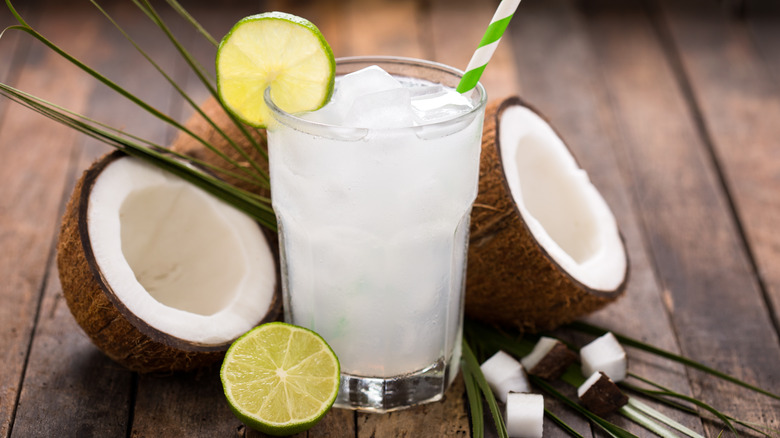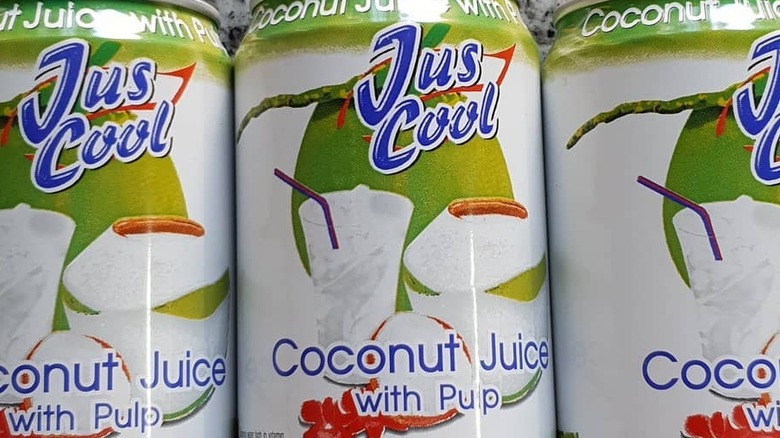Is There A Difference Between Coconut Water And Coconut Juice?
Nowadays, it's easy to find coconut water, coconut milk, coconut oil, and other similar products in most grocery stores across the U.S. and Europe. Not surprisingly, manufacturers are getting more creative with their offerings to spark curiosity and increase sales in the coconut products market, which was valued at more than $20.24 billion in 2022, according to Grand View Research.
For example, some brands are now selling coconut juice, making it sound like a breakthrough. One company describes it as the clear liquid inside young coconuts, praising its nutritional value and refreshing taste. But that's the definition of coconut water, which has been on the market for decades. Simply put, coconut juice is just another name for coconut water — though some brands may also contain pulp, sugar, and additives.
No matter what you call it, this beverage can be a nutritious addition to most diets. It's low in calories, high in electrolytes, and full of flavor. Enjoy it as is, or get a mineral boost by mixing it into smoothies, cocktails, or protein shakes, which are better for you than you think.
Coconut juice is pretty much the same thing as coconut water
Young green coconuts contain a clear liquid referred to as coconut water. People who live in tropical climates drink it in its natural form right from the coconut. The coconut water available in stores undergoes processing, which helps increase its shelf-life and preserve its flavor.
Coconut juice, a product sold by brands like Vita Coco and Dr. Antonio Martins, is a beverage based on coconut water. Dr. Antonio Martins' version contains only organic coconut juice, or coconut water, whereas Vita Coco sells a beverage made with coconut water, plain water, sugar, coconut pulp, and vitamin C. Panchy, a Thai brand, produces coconut juice from the same ingredients as Vita Coco.
Technically speaking, coconut juice is the same thing as coconut water, but it may contain sugar and other extras. However, some beverages marketed as "coconut water" have sugar, too, so they're no different from coconut juice. Is coconut water really that good for you? It depends. "The further the coconut is from the palm tree, [the more you should] question what else might be in that coconut water," holistic nutritionist Cordelia McFadyen told Forbes.
Is coconut water worth it?
Coconut water, or coconut juice, is rich in potassium, magnesium, calcium, manganese, and B-complex vitamins. Potassium, one of its most abundant nutrients, supports nerve and muscle function and maintains the body's fluid balance. Magnesium plays a key role in blood sugar control, energy metabolism, and bone growth, while calcium regulates your heart rhythm, among other functions.
However, the nutritional value of coconut water depends on its composition. Some brands contain only 50% coconut water, so they're relatively low in vitamins and minerals. But even if you opt for pure coconut water, you should still enjoy it in moderation. That's because the high potassium level may affect heart and kidney function when consumed in excess, warns Monique Richard, a dietician-nutritionist interviewed by Forbes.
Consume this drink before or after exercise to stay hydrated. You can also add it to soups, cooked meals, popsicles, or raw desserts to enhance their flavor. For starters, try this creamy smoothie with baby bananas, mint, and coconut water. It's chock-full of vitamins, minerals, and electrolytes and tastes like dessert.


